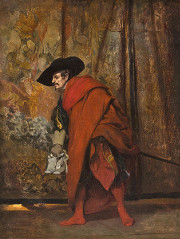|
Home
|
May 23, 2014
This week's themeWords coined after Shakespearean characters This week's words ophelian benedict hamlet bardolphian polonian 
Polonius behind the curtain
Art: Jehan Georges Vibert, 1968 This week's comments AWADmail 621 Next week's theme Miscellaneous words A.Word.A.Day
with Anu GargPolonian
PRONUNCIATION:
MEANING:
adjective: 1. Abounding in aphoristic expressions. 2. A native or inhabitant of Poland. ETYMOLOGY:
For 1: After Polonius, a courtier and the father of Ophelia
in Shakespeare's play Hamlet, known for his moralistic aphorisms.
Earliest documented use: 1847. For 2: From Latin Polonia (Poland). Earliest documented use: 1533. NOTES:
Some of Shakespeare's best-known quotations come out of Polonius's
mouth. As his son Laertes heads for France, Polonius advises: "Neither a borrower nor a lender be, For loan oft loses both itself and friend." "This above all: to thine own self be true, And it must follow, as the night the day, Thou canst not then be false to any man." At another time, he says: "Brevity is the soul of wit." As happens with quotations, some of his words have become simplified and sharpened with time, such as from the original "For the apparel oft proclaims the man" to "Clothes make the man." USAGE:
"A few Polonian precepts can do something to indicate whether or not
a scientist is cut out for collaboration." P.B. Medawar; Advice To A Young Scientist; Harper and Row; 1980. "Derek Mahon's admonitory phrases often sounds Polonian rather than Apollonian: 'Everything thrives on contrariety', 'Equip yourself in every way you can / to take it like a woman or a man.'" Hugh Haughton; The Poetry of Derek Mahon; Oxford University Press; 2007. A THOUGHT FOR TODAY:
A house is no home unless it contains food and fire for the mind as well as the body. -Margaret Fuller, author, critic, and women's rights advocate (1810-1850)
|
|
Subscriber Services
Awards | Stats | Links | Privacy Policy
Contribute | Advertise
Awards | Stats | Links | Privacy Policy
Contribute | Advertise
© 1994-2026 Wordsmith